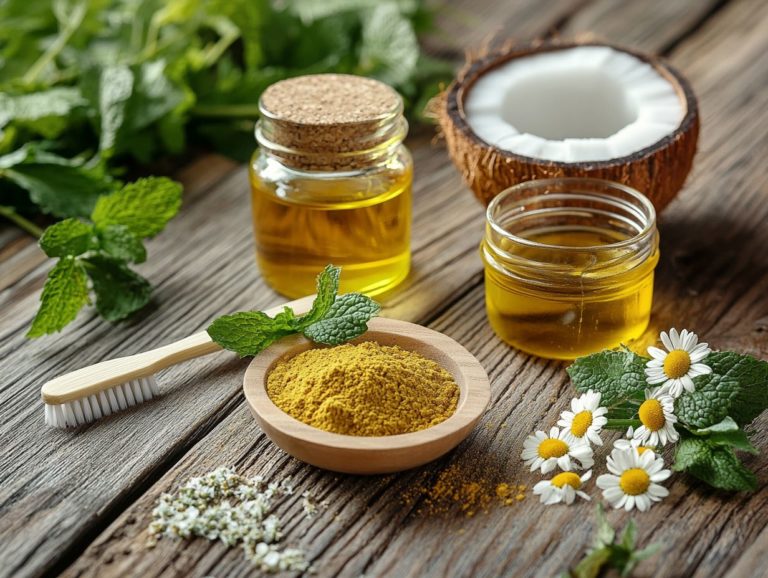Herbal Solutions for IBS Management
Irritable Bowel Syndrome (IBS) impacts millions, leading to discomfort and interference in daily life. Discover how you can take control of your symptoms and reclaim your daily life! It s essential for you to grasp its symptoms and causes to manage it effectively.
While conventional treatments such as medications and therapies are available, many individuals are now exploring the potential of herbal remedies for relief. Don t wait any longer explore these natural solutions today!
This article delves into various herbs and their benefits, highlighting the advantages of combining herbal solutions with traditional treatments. We will also underscore the importance of consulting healthcare professionals.
You ll also discover lifestyle changes that can enhance your IBS management. Embark on this journey toward improved gastrointestinal health!
Contents
- Key Takeaways:
- Understanding IBS (Irritable Bowel Syndrome)
- Conventional Treatment Options for IBS
- Herbal Remedies for IBS
- Combining Herbal Solutions with Conventional Treatment
- Precautions and Risks of Using Herbal Solutions for IBS
- Lifestyle Changes to Support IBS Management
- Frequently Asked Questions
- What is IBS and how can herbal solutions help manage it?
- What are some commonly used herbal solutions for IBS management?
- Are herbal solutions safe for managing IBS?
- What is the recommended dosage for herbal solutions?
- How long do herbal solutions take to work for IBS?
- Can herbal solutions completely cure IBS?
Key Takeaways:

- Herbal solutions can be a natural and effective way to manage IBS symptoms.
- Certain herbs, such as peppermint and ginger, have been shown to have beneficial effects on IBS.
- It is important to consult with a healthcare professional and combine herbal remedies with conventional treatment for optimal results.
Understanding IBS (Irritable Bowel Syndrome)
Irritable Bowel Syndrome (IBS) is a complex gastrointestinal disorder impacting millions around the globe. It manifests as abdominal bloating, chronic pain, and unpredictable bowel habits. If you’re navigating the challenges of IBS, you likely encounter considerable distress that can diminish your quality of life.
While the precise cause remains elusive, factors such as diet, stress, and genetic predisposition significantly contribute to its onset. Research indicates that traditional Chinese medicine and various alternative treatments may provide relief. This underscores that IBS is a multifaceted condition requiring a holistic approach to effective management.
Symptoms and Causes
Symptoms of Irritable Bowel Syndrome (IBS) can vary widely for you. However, you might typically encounter abdominal bloating, chronic pain, and changes in your bowel habits.
This condition often leaves you grappling with discomfort. Some days you may struggle with constipation, while on others, diarrhea may be your unwelcome companion. This showcases the diverse nature of this disorder. Dietary factors significantly contribute to the worsening of your IBS symptoms. Certain foods like dairy, gluten, and fermented products can trigger those unpleasant reactions you dread. Stress also plays a notorious role, as the gut-brain connection can dramatically influence your digestive health.
Many find that making conscious dietary changes, such as embracing a low-FODMAP diet (a diet low in certain carbohydrates that can cause digestive issues) or increasing fiber intake, can lead to significant improvements. This helps you alleviate the distress associated with IBS.
Conventional Treatment Options for IBS
Conventional treatment options for Irritable Bowel Syndrome (IBS) typically encompass a blend of medications, dietary adjustments, and therapies designed to alleviate symptoms.
Gastroenterologists, especially those associated with the American College of Gastroenterology, often prescribe medications aimed at improving bowel regularity and reducing abdominal discomfort.
Cognitive behavior therapy can improve the psychological aspects of IBS and enhance your quality of life. It s crucial for you to collaborate closely with healthcare providers to identify the most effective treatment strategy tailored to your unique needs.
Share your journey with IBS in the comments below, or consult a healthcare provider to start your path to relief!
Medications and Therapies
Medications for Irritable Bowel Syndrome (IBS) may include antispasmodics, laxatives, and probiotics. These medications help relax your gut muscles, relieve constipation, and restore gut flora, respectively.
These treatments focus on easing the discomfort many people experience. Antispasmodics effectively reduce abdominal cramps. Laxatives tackle constipation directly. You might also find relief through dietary supplements like evening primrose oil, which offers anti-inflammatory benefits. Probiotics further enhance gut health, creating a more balanced digestive system.
Therapies such as cognitive behavioral therapy (CBT) have gained recognition for effectively managing symptoms by addressing the psychological aspects of IBS. Incorporating stress reduction techniques like mindfulness and relaxation exercises is vital for minimizing flare-ups. Additionally, exploring herbal solutions for managing hypertension can further enhance a comprehensive approach that significantly improves your quality of life.
Herbal Remedies for IBS

Many people are excited to explore herbal remedies for Irritable Bowel Syndrome (IBS). Options range from peppermint oil to aloe vera, offering a diverse array of possibilities.
These natural solutions may ease abdominal bloating and chronic pain while enhancing overall digestive health. Understanding both the benefits and potential risks associated with herbal treatments is crucial as you consider incorporating them into your daily routine.
This knowledge helps you make informed choices as you navigate your health journey.
Types of Herbs and Their Benefits
Numerous herbs have been studied for their potential benefits in managing IBS, with peppermint oil and evening primrose oil often highlighted for their soothing qualities.
Among these, curcuma longa or turmeric stands out for its remarkable anti-inflammatory properties, effectively reducing gut inflammation and discomfort linked to IBS.
Chamomile is another noteworthy herb, celebrated for its calming effects and ability to alleviate bloating and gas.
Interestingly, melatonin, commonly associated with regulating sleep, also supports gut health and enhances bowel function.
Collectively, these herbs present a holistic approach for anyone seeking relief from IBS symptoms.
Combining Herbal Solutions with Conventional Treatment
Combining herbal solutions with conventional treatments for IBS offers a holistic approach to managing symptoms, enhancing effectiveness and satisfaction.
Practitioners increasingly recognize the synergistic benefits of integrating natural remedies like probiotics with traditional medications. This approach addresses both the physical and psychological dimensions of IBS.
By employing this multifaceted strategy, you can target abdominal bloating and chronic pain while incorporating stress reduction techniques that elevate your quality of life.
Possible Synergistic Effects
You may discover possible synergistic effects when combining herbal solutions and conventional treatments for IBS, particularly through integrating probiotics, dietary adjustments, and stress management techniques.
Embracing these approaches not only helps alleviate symptoms but also enhances your overall well-being. For example, incorporating probiotics like Lactobacillus and Bifidobacterium can significantly improve gut flora, working together with a fiber-rich diet to promote optimal digestive health.
Engaging in mindfulness practices such as meditation or yoga can mitigate stress, a common trigger for IBS, leading to meaningful improvements in your quality of life.
When these strategies are applied together, they often lead to more sustained relief from symptoms, highlighting the value of a holistic approach to managing IBS.
Precautions and Risks of Using Herbal Solutions for IBS
While herbal solutions can provide substantial benefits in managing Irritable Bowel Syndrome (IBS), it s essential to grasp the potential risks and precautions associated with their use. You might assume that herbal remedies are completely safe, but interactions with conventional medications and unique individual responses can complicate their effectiveness.
Consulting with a healthcare professional is vital to ensure that your chosen approach aligns seamlessly with your personal health goals and medical history.
Consulting with a Healthcare Professional

Consulting with a healthcare professional is a crucial step for anyone considering herbal remedies or dietary supplements to manage IBS. This ensures you receive tailored guidance that considers your unique health profile and any potential interactions with existing medications.
By engaging with knowledgeable providers, you can explore proven methods that integrate traditional medicine with holistic practices. Healthcare experts can evaluate the efficacy of the herbal options you re considering, help identify which ones align best with your treatment goals, and emphasize the importance of safe dosages. They will also highlight any potential side effects.
Ultimately, this collaborative approach enables you to make informed decisions, fostering a balanced strategy to alleviate IBS symptoms and enhance your overall well-being.
Lifestyle Changes to Support IBS Management
Lifestyle changes are essential in managing IBS, emphasizing the importance of dietary adjustments and stress reduction techniques to effectively alleviate symptoms.
By adopting a diet rich in magnesium-rich foods and soluble fiber, you can significantly enhance your digestive health and overall well-being.
Incorporate stress reduction strategies like mindfulness practices and regular exercise to greatly improve your quality of life while navigating the challenges of IBS.
Dietary and Stress Management Strategies
Implementing dietary and stress management strategies is essential for you, especially if you’re dealing with IBS. It s the key to achieving symptom relief and elevating your overall health, which can also be supported by alternative treatments.
By focusing on specific food choices and embracing mindfulness practices, you can experience significant improvements. Incorporating soluble fiber-rich foods like oats, beans, and certain fruits helps regulate digestion and can alleviate constipation. Additionally, exploring herbal remedies for relieving constipation can provide further relief. Probiotic-rich foods, particularly peppermint and evening primrose oil, support gut health by balancing gut flora and contributing to your digestive comfort.
Plus dietary modifications, adopting stress management techniques such as deep breathing exercises, yoga, or meditation is crucial. These practices play a vital role in calming your mind and promoting gut health. Furthermore, Cognitive Behavioral Therapy, which helps change negative thought patterns, and hypnotherapy can enhance your approach to managing IBS. Exploring DIY herbal remedies for digestive health can also complement this holistic approach, enabling you to take control of your symptoms and enhance your daily life.
Why not try these strategies and see how they work for you?
Frequently Asked Questions
What is IBS and how can herbal solutions help manage it?
IBS stands for Irritable Bowel Syndrome, a chronic digestive disorder characterized by symptoms such as abdominal pain, bloating, and changes in bowel movements. Herbal solutions, such as certain herbs and supplements, can provide relief from these symptoms and help manage the condition.
What are some commonly used herbal solutions for IBS management?

Some commonly used herbal solutions for managing IBS include peppermint, fennel, ginger, turmeric, aloe vera, and probiotics. These herbs and supplements have anti-inflammatory and anti-spasmodic properties that can help reduce symptoms of IBS.
Are herbal solutions safe for managing IBS?
Herbal solutions can be natural, but it’s essential to consult a doctor before using them for IBS. Some herbs may interact with medications or cause side effects, so professional guidance is crucial.
What is the recommended dosage for herbal solutions?
Dosage varies based on the specific herb or supplement. Always follow the product label’s instructions and consult a doctor for proper guidelines.
How long do herbal solutions take to work for IBS?
The time for herbal solutions to work can differ from person to person. Some might feel relief within days, while others could take weeks. Be patient and consistent for the best results.
Can herbal solutions completely cure IBS?
Herbal solutions can relieve and help manage IBS symptoms, but they cannot cure it. To effectively manage IBS, consider lifestyle changes and a healthy diet. Talk to your doctor for a comprehensive treatment plan.






